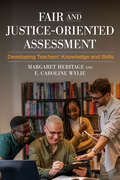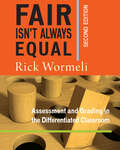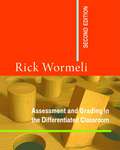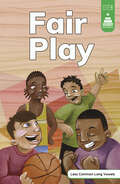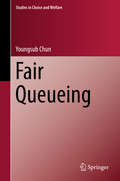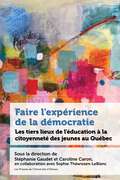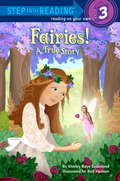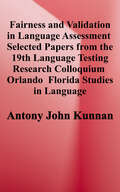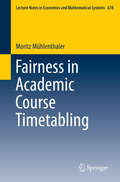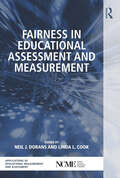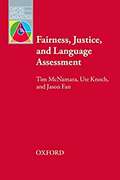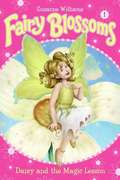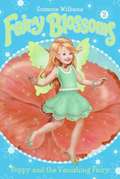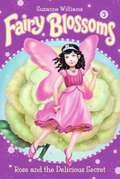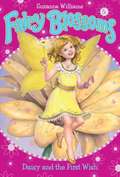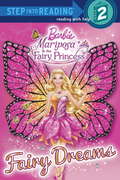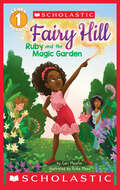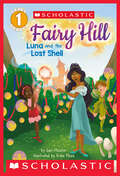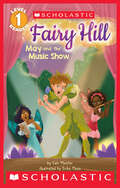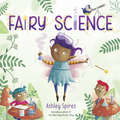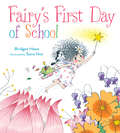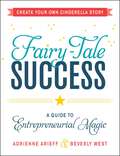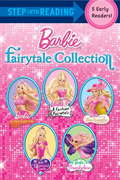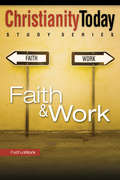- Table View
- List View
Fair And Justice-Oriented Assessment: Developing Teachers' Knowledge and Skills
by Margaret Heritage E. Caroline WylieIn Fair and Justice-Oriented Assessment, Margaret Heritage and Caroline Wylie propose that the key to improving learning opportunities for all students lies in increasing educators&’ assessment literacy. Only by examining various assessment practices through a lens of fairness and equity can practitioners best judge their use and value and then develop strategies for implementation that truly elevate student learning in alignment with school and district standards and in ways that are fair and just. To build better assessment literacy, Heritage and Wylie seek to strengthen professional knowledge of ambitious teaching and use of both formative and summative classroom assessment practices. They clearly describe the knowledge and skills teachers need to better orient classroom assessment practices toward more positive learning experiences for all students. Critically, they urge educators to establish substantive learning goals, attend to the ways of eliciting evidence of student learning towards those goals, and reflect on the evidence to take action that intends to advance learning. This book features real-world examples of assessment practices across a range of contexts and content areas, grade levels, and student populations, and shows how assessment literacy competencies can be achieved at scale with support from school and district leaders. Fair and Justice-Oriented Assessment provides a research-based and yet practical perspective on classroom assessment and advocates for the use of equity-oriented curricular and ambitious teaching.
Fair Isn't Always Equal: Assessment & Grading in the Differentiated Classroom
by Rick WormeliDifferentiated instruction is a nice idea, but what happens when it comes to assessing and grading students? How can you capture student progress, growth, and soft skill development and still provide an equitable grading environment?' An internationally recognized expert on grading practices, author Rick Wormeli revisits these questions in this thoroughly updated second edition of Fair Isn' t Always Equal: Assessment and Grading in the Differentiated Classroom.' Wormeli reflects on current grading and assessment practices and how they can exist with high-stakes, accountable classrooms. Important and sometimes controversial issues are tackled constructively in this book, incorporating modern pedagogy and addressing the challenges of teaching diverse groups of students across all learning levels.' Middle- and high-school educators will easily recognize' gray areas of grading and how important it is to have a shared school vision. In this second edition, new sections address sports eligibility, honor roll, descriptive feedback techniques, and gifted/talented students.' Previous chapters on test questions, redos/retakes, grading scales, and grading effort and behavior have been revised extensively. This important book clearly explains the principles behind best grading practices so that you' re ready for all grading questions or scenarios that you may encounter in your classrooms and schools.
Fair Isn't Always Equal: Assessment and Grading in the Differentiated Classroom
by Rick WormeliDifferentiated instruction is a nice idea, but what happens when it comes to assessing and grading students? What's both fair and leads to real student learning? An internationally recognized expert on grading practices, Rick Wormeli first examined these questions 10 years ago in the first edition of Fair Isn't Always Equal. In this thoroughly updated second edition, Rick provides a catalyst for serious reflection on current grading and assessment practices in differentiated classrooms. Coherent and effective standards-based grading practices for a high-stakes, accountability-focused world is also outlined. Recognizing the importance of having a shared school vision for assessment and grading, Rick addresses the challenges for teachers and administrators alike. Middle- and high-school educators will easily recognize real examples and gray areas of grading. Rick tackles important and sometimes controversial assessment and grading issues constructively, incorporating modern pedagogy and the challenges of working with diverse groups of students. New sections address sports eligibility, honor roll, descriptive feedback techniques, and gifted/talented students, and chapters on test questions, redos/retakes, grading scales, and grading effort and behavior have been revised extensively. This important book clearly explains the principles behind best grading practices so that you're ready for all grading questions or scenarios that you may encounter in your classrooms and schools.
Fair Play (Stairway Decodables Step 6)
by Leanna KochPlaying basketball in the gym after school is a blast! But when a new friend joins the group, his constant fouls ruin the game for everyone. Will the boys find a way to make basketball fun again? Stairway Decodables is a supplemental phonics resource that’s perfect for supporting small group instruction, independent reading, or reading practice at home. This title provides practice in decoding words with vowel-r combinations.
Fair Queueing
by Youngsub ChunThis monograph provides a detailed analysis on fair queueing rules from a normative, a strategic, and a non-cooperative viewpoint. The queueing problem is concerned with the following situation: There is a group of agents who must be served in a facility. The facility can handle only one agent at a time and agents incur waiting costs. The problem is to find the order in which to serve agents and monetary transfers they should receive. The queueing problem has been studied extensively in the recent literature.
Faire l’expérience de la démocratie: Les tiers-lieux de l’éducation à la citoyenneté des jeunes au Québec
by Stéphanie Gaudet Caroline Caron Sophie Théwissen-LeBlancFruit d’une démarche collaborative, Faire l’expérience de la démocratie présente les résultats d’une recherche ethnographique multisite dans sept organisations de la société civile québécoise. Il rend compte des observations, des analyses et de la comparaison d’une diversité de pratiques d’éducation citoyenne innovantes destinées aux jeunes dans ces « tiers-lieux », c’est-à-dire des espaces de socialisation différents de l’école etde la famille.Axé sur les cas analysés, l’ouvrage fait apparaître la variété des expériences formatrices offertes à de jeunes Québécoises et Québécois. La mise en commun des observations donne lieu à une réflexion féconde sur l’éducation à la citoyenneté démocratique à l’aide d’une pluralité d’expérimentations citoyennes inscrites dans la défense des droits des enfants, l’action sociale féministe, le mouvement communautaire, l’altermondialisme et l’action publique municipale et scolaire.Grâce à son vocabulaire conceptuel et à son approche méthodologique qualitative originale, cet ouvrage repousse les frontières géolinguistiques et disciplinaires qui séparent souvent des courants de recherche touchant de près ou de loin à l’engagement et à la participation sociale et politique des jeunes.
Fairies! A True Story (Step into Reading)
by Shirley Raye Redmond Red HansenFrom the forest fairies of West Africa to the magical brownies of Scotland, people have told stories about fairies for a long, long time. In England, two little girls shocked the world when they claimed that they had proof that fairies existed; they had photographs! But are fairies myth? Or are they magic? Fairy fans and beginning readers will delight in this easy-to-read look at fairy folklore and sightings through the ages.
Fairness and Validation in Language Assessment: Selected papers from the 19th Language Testing Research Colloquium, Orlando, Florida (Studies in Language Testing #9)
by Antony John KunnanFairness of language tests and testing practices has always been a concern among test developers and test users. In the past decade educational and language assessment researchers have begun to focus directly on fairness and related matters such as test standards, test bias and equity and ethics for testing professionals. <p><p>The 19th annual Language Testing Research Colloquium held in 1997 in Orlando, Florida, brought this overall concern into sharp focus by having 'Fairness in Language Testing' as its theme. The conference presentations and discussions attempted to understand the concept of fairness, define the scope of the concept and connect it with the concept of validation of test score interpretation. The papers in this volume offer a first introduction to fairness and validation in the field of language assessment.
Fairness in Academic Course Timetabling
by Moritz MühlenthalerThis monograph deals with theoretical and practical aspects of creating course timetables at academic institutions. The task is typically to create a timetable that suits the requirements of the stakeholders - students, lecturers, and the administration - as well as possible. The book presents an exposition of the basic combinatorial problems and solution methods for course timetabling and related tasks. It provides a rigorous treatment of fairness issues that arise in the course timetabling context and shows how to deal with the potentially conflicting interests of the stakeholders. The proposed methods are also readily applicable to other classes of scheduling problems such as staff rostering. Finally, it presents a comprehensive case study on the implementation of an automated course timetabling system at the school of engineering of the University of Erlangen-Nuremberg. The case study includes a detailed description of the problem model as well as an evaluation of stakeholder satisfaction.
Fairness in Educational Assessment and Measurement
by Neil J. Dorans Linda L. CookThe importance of fairness, validity, and accessibility in assessment is greater than ever as testing expands to include more diverse populations, more complex purposes, and more sophisticated technologies. This book offers a detailed account of fairness in assessment, and illustrates the interplay between assessment and broader changes in education. In 16 chapters written by leading experts, this volume explores the philosophical, technical, and practical questions surrounding fair measurement. Fairness in Educational Assessment and Measurement addresses issues pertaining to the construction, administration, and scoring of tests, the comparison of performance across test takers, grade levels and tests, and the uses of educational test scores. Perfect for researchers and professionals in test development, design, and administration, Fairness in Educational Assessment and Measurement presents a diverse array of perspectives on this topic of enduring interest.
Fairness, Justice, and Language Assessment
by Tim McNamara Ute Knoch Oxford Editors Jason FanThis book has two goals, each related to the validity of language assessment. The first goal is to explore the difference between fairness and justice in language assessment. <p><p> The authors distinguish internal and external dimensions of the equitable and just treatment of individuals taking language tests which are used as gatekeeping devices to determine access to education and employment, immigrant status, citizenship, and other rights. <p><p> The second goal is to show how the extent of test fairness can be demonstrated and improved using the tools of psychometrics, in particular the models collectively known as Rasch measurement.
Fairy Blossoms #1: Daisy and the Magic Lesson
by Suzanne Williams Fiona SansomAt Mistress Lily's Fairy School, Daisy is learning to be a fairy helper to humans-and she makes the most wonderful new friends! Violet can turn invisible. Poppy can shape-shift. Marigold can change her wings to match her clothes. Daisy doesn't know any magic at all, but she gets a chance to discover her own special talent when a human in trouble needs the fairies' help!
Fairy Blossoms #2: Poppy and the Vanishing Fairy
by Suzanne Williams Fiona SansomMistress Lily is gone for the day, and Poppy hopes she'll hurry home. Then Mistress Lily doesn't come back on time-something must be wrong! With the help of their flying ponies, Poppy and her friends set off to find out what's happened to their teacher. They discover a magical creature and a mysterious enchantment!
Fairy Blossoms #3: Rose and the Delicious Secret
by Suzanne Williams Fiona SansomEveryone is delighted when delicious treats start appearing overnight at Mistress Lily's Fairy School! Everyone except Cook, that is-he doesn't want someone else to do his job. Can Rose find out what's going on and restore harmony to the Cloverleaf Cottage kitchen?
Fairy Blossoms #5: Daisy and the First Wish
by Suzanne Williams Fiona SansomDaisy loves helping humans-it's what she's always wanted to do. Then she meets a little girl named Nina who makes an impossible wish. Daisy's magic wand can't give Nina what she wants-but maybe Daisy can find another way!
Fairy Dreams (Barbie)
by Mary Man-KongGirls ages 4-6 will love learning to read on their own with this Step 2 Step into Reading leveled reader based on Barbie's latest film.
Fairy Hill: Fairy Hill #1) (Scholastic Reader, Level 1)
by Cari MeisterMeet the magical fairies of Fairy Hill!Fairy Hill is a magic forest where fairies live, play, and have lots of sparkly adventures in this Level 1 reader series! Ruby, Luna, and May are best friends. These young fairies are all looking forward to earning their big wings from the Fairy Queen. But first they each have to do something extra kind or brave. In book #1, Ruby, May, and Luna discover that Fairy Hill's magic garden has lost its sparkle! The fairies try everything to make the garden shine again, but nothing works. Then, a lost baby deer comes to the garden for help. The only way to help it find its way home is to feed it magic clover. Then Ruby has an idea! Will she be able to fix the garden and help the baby deer? Will the Fairy Queen visit the fairy friends?
Fairy Hill: Fairy Hill #2) (Scholastic Reader, Level 1)
by Cari MeisterIt's time for another adventure in Fairy Hill!Fairy Hill is a magic forest where fairies live, play, and have lots of sparkly adventures in this Level 1 reader series! Ruby, Luna, and May are best friends. These young fairies are all looking forward to earning their big wings from the Fairy Queen. But first they each have to do something extra kind or brave. In book #2, a magic shell goes missing! Without it, the glow globes that light up Fairy Hill will all go dark -- and the Fairy Queen will have to cancel the Fairy Ball! Luna, Ruby, and May go looking for the shell. They find out a chipmunk is using it to light his tree. Luna has an idea to get the shell back! Will she be able to bring the light back to Fairy Hill before the ball?
Fairy Hill: May and the Music Show (Scholastic Reader, Level 1)
by Cari Meister Erika MezaMeet the magical fairies of Fairy Hill!Fairy Hill is a magic forest where fairies live, play, and have lots of sparkly adventures in this Level 1 reader series! Ruby, Luna, and May are best friends. These young fairies are all looking forward to earning their big wings from the Fairy Queen. But first they each have to do something extra kind or brave. In this third book, Ruby, May, and Luna are performing in a fairy music show! It is their first show, and the girls are nervous. They practice together -- and Luna gets ready for her big solo. But then, when it's time to sing, Luna gets stage fright! Can May help her friend finish the concert? Will the Fairy Queen visit the fairies again?
Fairy Science (Fairy Science)
by Ashley SpiresAn enchanting STEM-and-fairy-filled picture book from the award-winning author-illustrator of The Most Magnificent Thing!All the fairies in Pixieville believe in magic--except Esther. She believes in science.When a forest tree stops growing, all the fairies are stumped--including Esther. But not for long! Esther knows that science can get to the root of the problem--and its solution! Whether you believe in fairy magic or the power of science, you will be charmed by Esther, the budding fairy scientist.
Fairy's First Day of School
by Bridget HeosFrom the author of Mustache Baby, a picture book about a tiny fairy who has all the typical experiences a child might on the first day of school, but with silly fairy-like twists. In this humorous and reassuring picture book from the author of Mustache Baby, a sweet fairy has a fun-filled first day at school. Her experience is remarkably similar to the first day of preschool for human children. From circle time (sitting crisscross berry sauce) to center time (art, spells, tooth), all the activities one might encounter at school are explored, with sweet fairy-like touches. Best of all is the kind, warm teacher and plenty of new friends. The perfect story to ease fears and build anticipation for any child—human or fairy—starting school for the first time.
Fairy-Tale Success
by Beverly West Adrienne ArieffAdvice for achieving your business goals! Meet Skyler Bouchard, founder and editor-in-chief of NYU's first culinary website, NYU Spoon; Kit Hickey, cofounder of the menswear company Ministry of Supply; and Daisy Jenks, founder of the video and film production company Jenks & Co. These amazing women and countless others have turned their passions into a thriving venture--and now, you can, too! Written by business experts Adrienne Arieff and Beverly West, Fairy-Tale Success not only shares the success stories of innovative female entrepreneurs like Skyler, Kit, and Daisy, but also offers real-life strategies for launching your own business. Arieff and West guide you through the entire process, with important entrepreneurial lessons that show you how to turn your ideas into a reality and teach you the skills needed to ensure your business's sustainability. You'll find thought-provoking exercises and quizzes, sample budgets, and examples of successful marketing strategies that will help you design a business plan that works for you. Complete with advice from a talented and inspiring advisory board, Fairy-Tale Success proves that you don't need a fairy godmother to make your dreams come true--all the entrepreneurial magic you need is already inside of you.
Fairy-Tale Success: A Guide to Entrepreneurial Magic
by Adrienne ArieffAdvice for achieving your business goals!Meet Skyler Bouchard, founder and editor-in-chief of NYU's first culinary website, NYU Spoon; Kit Hickey, cofounder of the menswear company Ministry of Supply; and Daisy Jenks, founder of the video and film production company Jenks & Co. These amazing women and countless others have turned their passions into a thriving venture--and now, you can, too!Written by business experts Adrienne Arieff and Beverly West, Fairy-Tale Success not only shares the success stories of innovative female entrepreneurs like Skyler, Kit, and Daisy, but also offers real-life strategies for launching your own business. Arieff and West guide you through the entire process, with important entrepreneurial lessons that show you how to turn your ideas into a reality and teach you the skills needed to ensure your business's sustainability. You'll find thought-provoking exercises and quizzes, sample budgets, and examples of successful marketing strategies that will help you design a business plan that works for you.Complete with advice from a talented and inspiring advisory board, Fairy-Tale Success proves that you don't need a fairy godmother to make your dreams come true--all the entrepreneurial magic you need is already inside of you.
Fairytale Collection (Barbie)
by Random HouseThis magical collection includes five early readers based on the Barbie films Barbie: Fashion Fairytale, Barbie in a Mermaid Tale, Barbie and the Three Musketeers, Barbie and the Diamond Castle, and Barbie: Thumbelina. Featuring fairies, princesses, mermaids, and more, little girls ages 4 to 6 won't be able to resist!
Faith & Work (Christianity Today Study Series)
by Christianity Today InternationalThe Christian Today Study Series delves into today's vital cultural issues to get to the heart of what these topics mean to you.Each 8-week study is based on articles written by some of today's leading Christian authors and published by the Christianity Today magazines. These remarkable studies will foster deep, authentic, and relevant discussion that will challenge and grow any small group.Faith & Work will take on a variety of topics, such as:Work-Drudgery or Delight?Ambition and AchievementA Witness at the WorkplaceWork & Sabbath RestBased on articles by a variety of authors, such as:Chuck ColsonChristine GardnerMarshall Shelley
